- Home
- Norman, John;
Blood Brothers of Gor
Blood Brothers of Gor Read online
Blood Brothers of Gor
The Gorean Saga: Book 18
John Norman
1
The Pte
"There it is," said Grunt, pointing ahead and to our right. "Do you see it?"
"Yes," I said. "Too, I feel it." I could feel the tremor in the earth, even through the paws and legs of the lofty, silken kaiila.
"I have seen it only once before," he said.
I rose in the stirrups. The vibration, clearly, was registered in the narrow, flat-based rings. Earlier, dismounted, we had placed the palms of our hands to the earth. It was then that we had first felt it, earlier this morning, from as faraway as perhaps twenty pasangs.
"They are coming," had said Cuwignaka, happily.
"I am puzzled," said Grunt. "It is early, is it not?"
I sat back on the saddle.
"Yes," said Cuwignaka, astride his kaiila, to my left.
The current moon was Takiyuhawi, the moon in which the tabuk rut. It is sometimes known also as Canpasapawi, or the moon when the chokecherries are ripe.
"I do not understand," said Grunt. "It is not due until Kantasawi." This was the moon in which the plums become red. It is generally the hottest time of the year in the Barrens. It occurs in the latter portion of the summer.
"Why is it early?" asked Grunt.
"I do not know," said Cuwignaka.
Our kaiila shifted beneath us, on the grassy rise. The grass here came to the knees of the kaiila. It would have come to the thighs of a girl.
"Perhaps there is some mistake," I suggested. "Perhaps it is not what you think."
"There is no mistaking it," said Grunt.
"No," said Cuwignaka, happily.
"Could it not be another?" I asked.
"No," said Cuwignaka.
"These things are like the summer and the winter," said Grunt, "like the phases of the moons, like day and night."
"Why then is it early?" I asked.
"Has it been early before?" asked Grunt of Cuwignaka.
"Not in my lifetime," said Cuwignaka. "In the old stories it has sometimes been late, but never, as far as I know, has it been early."
"Think," I said. "Can you recall nothing of such a sort?"
Cuwignaka shrugged. "I can think of nothing of that sort," he said.
"Can there be no mistake?" I asked Grunt.
"No," said Grunt. "It is here."
"It looks like it is raining there," I said.
"That is dust, in the wind," said Cuwignaka. "It is raised by the hoofs."
"It is here," said Grunt. "There is no doubt about it."
I looked into the distance. It was like a Vosk of horn and hide.
"How long is it?" I asked. I could not even see the end of it.
"It is probably about fifteen pasangs in length," said Grunt. "It is some four or five pasangs in width."
"It can take the better part of a day to ride around it," said Cuwignaka.
"How many beasts are numbered in such a group?" I asked.
"Who has counted the stars, who has numbered the blades of grass," said Cuwignaka.
"It is estimated," said Grunt, "that there are between some two and three million beasts there."
"Surely it is the largest such group in the Barrens," I said.
"No," said Grunt, "there are larger. Boswell claims to have seen one such group which took five days to swim a river."
"How long would it take a group like this to swim a river?" I asked.
"Two to three days," said Grunt.
"I see," I said. The Boswell he had referred to, incidentally, was the same fellow for whom the Boswell Pass through the Thentis Mountains had been named. He was an early explorer in the Barrens. Others were such men as Diaz, Hogarthe and Bento.
"It is an awesome and splendid sight," I said. "Let us ride closer."
"But let us be careful," said Cuwignaka. Then, with a cry of pleasure, kicking his heels back into the flanks of his kaiila, he urged his beast down the slope.
Grunt and I looked at one another, and grinned. "He is still a boy," said Grunt.
We then followed Cuwignaka. It was toward noon when we reined up beside him on another rise. The animals were now some three to four pasangs away, below us.
"It is the Pte!" called out Cuwignaka happily to us, turning to look at us.
"Yes," said Grunt.
We could now smell the animals clearly. My mount, a lofty black kaiila, silken and swift, shifted nervously beneath me. Its nostrils were flared. Its storm lids were drawn, giving its large round eyes a distinctive yellowish cast. I did not think that it, a kaiila purchased some months ago in the town of Kailiauk, near the perimeter, had ever smelled such beasts before, and certainly not in such numbers. Too, I supposed that there were many among such beasts, perhaps most, in fact, who had never smelled a man, or a kaiila, before. Grit and dust settled about us. I blinked my eyes against it. It was very impressive to be so close to such beasts. I scarcely dared to conjecture what it might be like to be even closer, say, within a few hundred yards of them. Individual kills on such animals, incidentally, are commonly made from distances where one can almost reach out and touch the beast. One must be that close for the lance thrust to be made or for the arrow, from the small bow, to strike with sufficient depth, to the feathers, either into the intestinal cavity behind the last rib, resulting in large-scale internal hemorrhaging, or behind the left shoulder blade, into the heart.
"Is there always this much dust?" I asked. I raised my voice somewhat, against the sounds of the beasts, their bellowing and the thud of the hoofs.
"No," said Cuwignaka, raising his voice. "It is moving now, not drifting and grazing."
"Sometimes, for no clear reason," said Grunt, "it will move, and more or less swiftly. Then, at other times, for similarly no apparent reason, it will halt and graze, or move slowly, gently grazing along the way."
"It is early," I said.
"Yes," said Grunt. "That is interesting. It must have been moving more than is usual."
"I will inspect the animals," said Cuwignaka.
"Be careful," said Grunt.
We watched Cuwignaka move his kaiila down the slope and toward the animals. He would not approach them too closely. There were tribal reasons for this.
"It is like a flood," I said, "or a movement of the earth; it is like wind, or thunder; it is like a natural phenomenon."
"Yes," said Grunt.
"In its way," I said, "I suppose it is a natural phenomenon."
"Yes, in its way, it is," said Grunt.
The movement of this group of animals had been reported in the camp of the Isbu Kaiila, or the Little-Stones band of the Kaiila, for more than ten days now, in a rough map drawn to the east of the camp, with notched sticks, the notching indicating the first and second day, and so on, of the animals' progress, and the placement of the sticks indicating the position of the animals on the day in question. Scouts of the Sleen Soldiers, a warrior society of the Isbu, had been keeping track of the animals since they had entered the country of the Kaiila more than two weeks ago. This was a moon in which the Sleen Soldiers held police powers in the camp, and so it was to their lot that numerous details, such as scouting and guarding, supervising the camp and settling minor disputes, now fell. Among their other duties, of course, would come the planning, organization and policing of the great Wanasapi, the hunt or chase.
In a few Ehn Cuwignaka, sweating, elated, his braided hair behind him, returned his lathered kaiila to our side.
"It is glorious!" he said.
"Good," said Grunt, pleased at the young man's pleasure.
It is difficult to make clear to those who are not intimately acquainted with such things the meaning of the Pte, or Kai
liauk, to the red savages. It is regarded by them with reverence and affection. It is a central phenomenon in their life, and much of their life revolves around it. The mere thought of the kailiauk can inspire awe in them, and pleasure and excitement. More to them than meat for the stomach and clothes for the back is the kailiauk to them; too, it is mystery and meaning for them; it is heavy with medicine; it is a danger; it is a sport; it is a challenge; and, at dawn, with a lance or bow in one's hand, and a swift, eager kaiila between one's knees, it is a joy to the heart.
"Look," said Grunt, pointing to the right.
A rider, a red savage, was approaching rapidly. He wore a breechclout and moccasins. About his neck was a string of sleen claws. There were no feathers in his hair and neither he nor his animal wore paint. Too, he did not carry lance and shield. He was not on the business of war. He did have a bow case and quiver, and at the thong on his waist was a beaded sheath, from which protruded the hilt of a trade knife.
"It is Hci," said Cuwignaka. There is no exact translation of the expression 'Hci' from Kaiila, into either Gorean or English. This is not all that unusual, incidentally. One cannot expect identical regularities in meaning and usage to obtain in diverse linguistic communities. The expression, for most practical purposes, signifies a certain type of gap, such as, for example, might occur in the edge of a trade ax, or hatchet, for use in drawing nails, an occupation for which the red savages, of course, have little use. It is also used more broadly for a gash, such as an ax might cut in a tree, or for a cut or scar. It seems to be clearly in the latter range of meanings that the name belonged. At the left side of Hci's face, at the chin, there was an irregular, jagged scar, some two inches in length. This dated from several years ago, when he had been seventeen, from the second time he had set the paws of his kaiila on the warpath. It had been given to him by a Yellow Knife in mounted combat, the result of a stroke by a long-handled, stone-bladed tomahawk, or canhpi. Before that time, as a stalwart, handsome lad, he had been affectionately known as Ihdazicaka, or One-Who-Counts-Himself-Rich. Afterwards he had become, by his own wish, only Hci. He had become morose and cruel. Immersing himself in the comraderie, and the rituals and ceremonies of the Sleen Soldiers, it seemed he lived then for little other than the concerns of raiding and war. There were members of his own society who feared to ride with him, so swift, so fierce, so careless of danger he was. Once, in a fight with Fleer, he had leaped to the ground and thrust his lance through the long, trailing end of the society's war sash, which, on that occasion, he had been wearing. He thus fastened himself in place, on foot, among the charging Fleer. "I will not yield this ground!" he had cried. The fleeing members of his society, seeing this, and knowing that he wore the war sash, had then rallied and, though outnumbered, had charged the Fleer. The Fleer, eventually, had left the scene of battle, feeling the cost of obtaining a victory over such men would be too high. As they left they had raised their lances in salute to the young warrior. Such courage is acknowledged in the Barrens, even though it be in an enemy.
Hci reined in his kaiila, squealing, kicking dust, before us.
The disfigurement was indeed prominent. The blow of the canhpi had slashed through to the jawbone.
"What are you doing here?" demanded Hci, speaking in Kaiila. I could now, given my time with Grunt and Cuwignaka, and my time in the Isbu camp, follow much of what was said. I could now, too, to some extent, communicate in that expressive, sibilant language.
"We have come to see the Pte," said Cuwignaka. The expression 'Pte', literally, stands for the kailiauk cow, as 'Tatanka' stands for the kailiauk bull, but it is commonly used colloquially, more generally, to stand for the kailiauk in general. In a sense, the "Pte" may be considered the mother of the tribes, as it is through her that their nomadic life, in its richness and variety, becomes possible. More formally, of course, one speaks of the kailiauk. The expression 'kailiauk' is a Gorean word and, as far as I know, does not have an Earth origin.
I looked beyond Hci to the beasts, some two to three pasangs away. The kailiauk is a large, lumbering, shaggy, trident-horned ruminant. It has four stomachs and an eight-valved heart. It is dangerous, gregarious, small-eyed and short-tempered. Adult males can stand as high as twenty or twenty-five hands at the shoulder and weigh as much as four thousand pounds.
"You have no right here," said Hci, angrily.
"We are causing no harm," said Cuwignaka.
"No one will hunt until the great hunt," said Hci. "Then we will hunt. The Isbu will hunt. The Casmu will hunt! The Isanna will hunt! The Napoktan will hunt! The Wismahi will hunt! The Kaiila will hunt!"
The Isbu, or Little-Stones band; the Casmu, or Sand, band; the Isanna, the Little-Knife band; the Napoktan, or Bracelets, band; and the Wismahi, or Arrowhead band, are the five bands which constitute the Kaiila tribe. The origins of these names are not always clear. It seems probable that the Little-Stones and the Sand bands may have had their names from geographical features, perhaps those adjacent to riverside encampments. The Wismahi, or Arrowhead, band is said by some to have once made their winter camp at the confluence of two rivers, the joining of the rivers resembling the point of an arrowhead. Others claim that they once lived in a flint-rich area and, prior to the general availability of trade points, conducted a lively trade in flint with surrounding tribes. The Bracelets band, or the Napoktan, wear copper bracelets on the left wrist. This band, outside of the Kaiila, is often known as the Mazahuhu band, which is the Dust-Leg word for bracelets. I do not know the origin of the name for the Isanna, or the Little-Knife, band. Sometimes, as I suspect was the case with the Napoktan, these names may owe their origin to the idiosyncrasies of given leaders, to unique historical events or perhaps, even, to dreams. Dreams, and dreaming on matters of importance, are taken very seriously by the red savages. Indeed, is it not that in dreams one may even enter the medicine world itself? In dreams is it not the case that one might sit about the fires of the dead, conversing with them? Is it not the case that in dreams one may understand the speech of animals? And is it not the case that in dreams one may find oneself in distant lands and countries, moons away, and yet, in a single night, find oneself, awakening, returned to one's lodge, to the embers of one's fire and the familiar poles and skins about one?
"We are here to see the Pte," said Cuwignaka, "not to hunt."
"It is well for you," said Hci, angrily. "You well know the penalties for illicit hunting."
Cuwignaka did not even deign to respond. To be sure, the penalties were not light. One might be publicly denounced and abused, even beaten, in the village. One's weapons could be broken. One's lodge, and robes, and possessions could be taken away or cut to pieces with knives and scattered to the winds. In the beliefs of the red savages the welfare of the whole, that of the tribe, takes precedence over the welfare of the individual. In the thinking of the red savages the right to diminish and jeopardize the community does not lie within the prerogatives of the individual.
"Go away!" said Hci, with an angry wave of his arm.
Cuwignaka stiffened on the back of his kaiila.
Hci angrily gestured to the string of sleen claws about his neck, the sign of the Sleen Soldiers.
"It is an order," said Grunt to Cuwignaka, in Gorean. "He is well within his authority, as you know. He is a Sleen Soldier, and it is among his duties to track and protect the kailiauk. Do not think of it as a personal thing. He is a Sleen Soldier, doing his work. In his place you would doubtless do much the same."
Cuwignaka nodded, recognizing the justice of this view. It was not Hci, so to speak, who was being obeyed, but rather a duly constituted authority, an officer, a constable or warden in such matters.
We turned our kaiila about, to take our way from the place.
"Women, slaves and white men are not to ride forth to look upon the Pte," called Hci after us.
Cuwignaka wheeled his kaiila about, angrily. I, wheeling about, too, caught his arm.
"I am not a woman!" said Cuwignaka.
Hci laughed.
"I am not a woman," said Cuwignaka.
"You are a woman," said Hci. "You should please warriors."
"I am not a woman," said Cuwignaka.
"You do not wear the breechclout," said Hci. "You did not take the warpath."
"I am not a woman," said Cuwignaka.
"You wear the dress of a woman," said Hci. "You do the work of a woman. I think I will give you the name of a woman. I think I will call you Siptopto."
Cuwignaka's fists clenched on the reins of his kaiila. The expression 'Siptopto' is a common expression for beads.
"You should please warriors," said Hci.
"No," said Cuwignaka.
"You did not take the warpath," said Hci.
"I had no quarrel with the Fleer," said Cuwignaka.
"You are not welcome among the Isbu," said Hci. "You shame them. You cannot mate among us. Why do you not go away?"
"I am Isbu," said Cuwignaka. "I am Isbu Kaiila!"
My hand on his arm restrained Cuwignaka from charging Hci. Had he attempted to do so he would have been, without a saddle, dragged literally from the back of the kaiila.
"You should have been left staked out," said Hci. "It would have been better for the Kaiila."
Cuwignaka shrugged. "Perhaps," he said. "I do not know."
Cuwignaka, on the back of his kaiila, wore the remains of a white dress, a portion of the loot of a destroyed wagon train. He had been a slave of soldiers traveling with the train. Originally he had been Isbu Kaiila. He had twice refused to go on the warpath against the Fleer, hereditary enemies of the Kaiila. The first time he had been put in the dress of a woman and forced to live as a woman, performing the work of a woman and being referred to in the feminine gender. It was from that time that he had been called Cuwignaka, which means "Woman's Dress." It is, moreover, the word for the dress of a white woman and, in this, given the contempt in which the proud red savages hold white females, commonly reducing them to fearful, groveling slaves, utilizing them as little more than beasts of burden and ministrants to their will, in all respects, it possesses to the Kaiila an additional subtle and delicious irony.

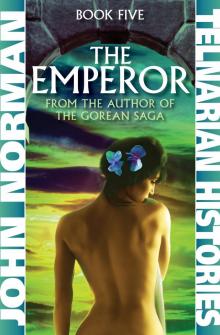 The Emperor
The Emperor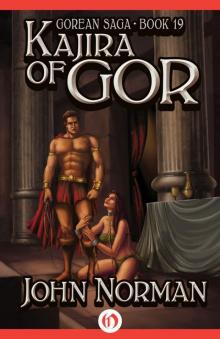 Kajira of Gor
Kajira of Gor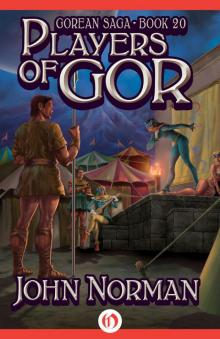 Players of Gor
Players of Gor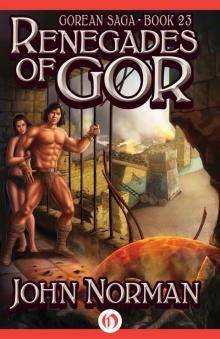 Renegades of Gor
Renegades of Gor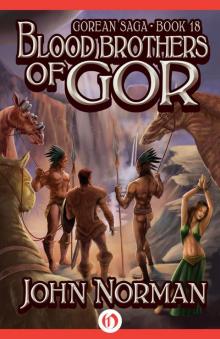 Blood Brothers of Gor
Blood Brothers of Gor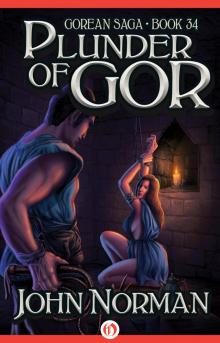 Plunder of Gor
Plunder of Gor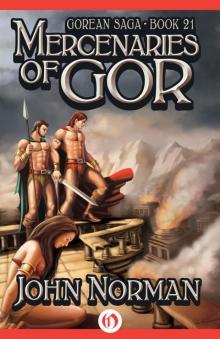 Mercenaries of Gor
Mercenaries of Gor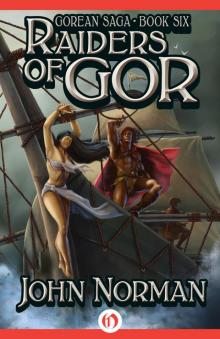 Raiders of Gor
Raiders of Gor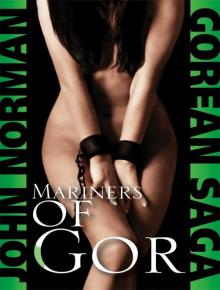 Gor 30 - Mariners of Gor
Gor 30 - Mariners of Gor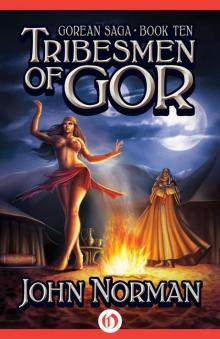 Tribesmen of Gor
Tribesmen of Gor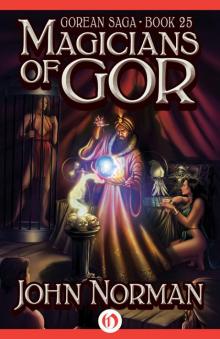 Magicians of Gor
Magicians of Gor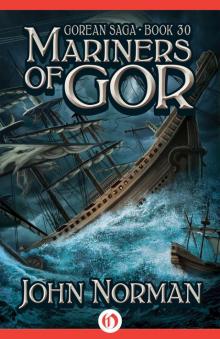 Mariners of Gor
Mariners of Gor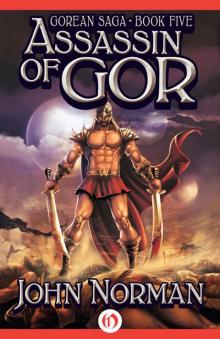 Assassin of Gor
Assassin of Gor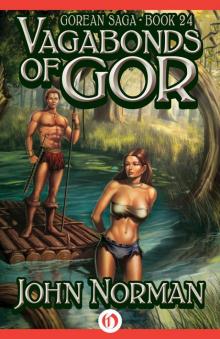 Vagabonds of Gor
Vagabonds of Gor